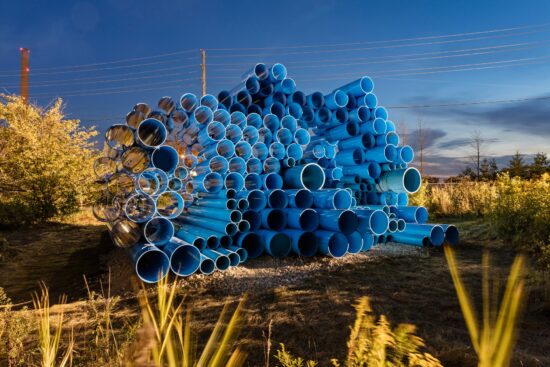Nomeda and Gediminas Urbonas

Futurity Island. Nomeda & Gediminas Urbonas in collaboration with Indrė Umbrasaitė, Nicole L’Huillier, Tobias Putrih, 2019.
Nomeda and Gediminas Urbonas (born 1968 and 1966) are artists, educators, and founders of ‘US: Urbonas Studio’, an interdisciplinary research practice which facilitates exchange amongst diverse nodes of knowledge production and artistic practices. Combining urbanism, new media, social science, and pedagogy, their projects critically address transformations of civic space and ecology and promote collective imaginaries.
Nomeda and Gediminas Urbonas attained international recognition for their socially interactive and interdisciplinary practice of exploring the conflicts and contradictions posed by the economic, social, and political conditions of countries that are in flux. Often beginning with archival research, the duo develops their work into complex projects, involving different disciplines, which investigate the urban environment, architectural development, cultural and technological heritage, environmental study, and ecosystemic relationships. They develop models for social and artistic practice, with the aim of designing self-organizing structures that would question the relativity of freedom; they often use art as a platform to make public spaces suitable for the inclusion of various social groups. Combining the tools of both new and traditional media, their work often involves collective activities, such as workshops, lectures, discussions, television programmes, internet chat rooms, and public protests – everything which stands at the intersection of art, technology, and social criticism.
Nomeda and Gediminas Urbonas have exhibited internationally, including at the biennials in São Paulo, Berlin, Moscow, Lyon, Gwangju, Busan, and Taipei, the Folkestone Triennial, Venice Biennale of Architecture, and other international events, such as Manifesta and Documenta exhibitions. The duo have also represented Lithuania at the Venice Biennale and have held a solo show at the Barcelona Museum of Contemporary Art (MACBA). Their work has been awarded multiple high-ranking grants and residency awards, including the Lithuanian National Culture and Art Prize (2007), a fellowship at the Montalvo Arts Center in California (2008), the Prize for the Best International Artist at the Gwangju Biennale (2006), and the Prize for the best national pavilion at the Venice Biennale (2007). In 1993, they founded the first independent interdisciplinary art institution Jutempus, and, in 2000, initiated the activities of the Vilnius Interdisciplinary Lab for Media Arts (VILMA), and published the online media art journal ‘Balsas’.
Their works about art research as an intervention into a social and economic crisis have been published in such books as ‘Villa Lituania’ (Sternberg Press, 2008) and ‘Devices for Action’ (MACBA Press, 2008. Urbonas edited the collection of articles, ‘Public Space? Lost & Found’ (MIT Press, 2017), which invited artists, urban planners, theorists, and art historians to analyze the complex inter-relations between the creation and use of public space and the role that art plays in it. Another book, edited by Urbonas, ‘Swamps and the New Imagination. On the Future of Cohabitation in Art, Architecture, and Philosophy’ (forthcoming) will shortly be published in 2020 by Sternberg Press and MIT Press.
Urbonas’s works have been included in the contemporary art collections of the Barcelona Museum of Contemporary Art (MACBA), Frac Nord-Pas de Calais in Dunkirk, Helsinki Art Museum, Museum of Contemporary Art Kiasma in Helsinki, the State Museum Schwerin in Germany, Luigi Pecci Contemporary Art Center in Italy, the National Gallery of Arts in Vilnius.
Nomeda and Gediminas Urbonas have given lectures internationally, including a lectureship at the Norwegian University of Science and Technology (2005-2009); they currently work as guest lecturers at the Vytautas Magnus University in Kaunas, the Central Academy of Fine Arts (CAFA) in Beijing, and the Nuova Accademia di Belle Arti (NABA) in Milan.
Gediminas Urbonas is a professor at the Art, Culture and Technology programme at the MIT in Cambridge (the US); Nomeda is a researcher at the MIT and a doctoral student at the Norwegian University of Science and Technology in Trondheim (Norway). They live and work in Cambridge, the US, and Vilnius, Lithuania.
www.nugu.lt